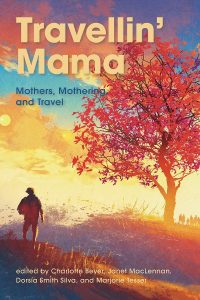 Travellin’ Mama: Mothers, Mothering, and Travel
Travellin’ Mama: Mothers, Mothering, and Travel
Edited by Charlotte Beyer, Janet MacLennan, Dorsía Smith Silva, and Marjorie Tesser
Review by Stephanie May de Montigny
In Travellin’ Mama each of us likely will find something that resonates with our own experiences of the challenges and joys of travelling as mothers. But every reader also will find something new through which they may learn about different lives and perspectives, both past and present.
Edited by Charlotte Beyer, Janet MacLennan, Dorsía Smith Silva, and Marjorie Tesser, this diverse collection assembles essays, poetry, and scholarly analyses, all centered around mothers’ experiences of traveling with and without children. Contributors include poets, anthropologists, scholars of writing, literature, English studies, historians, writers of fiction and creative nonfiction, a playwright, and a midwife. The book’s sections broadly define travel through themes of relocation, adventure, identity, discovery, work, culture, and exigency. The introduction contextualizes how the individual pieces fit the themes, connect to each other, and to broader literatures on mothering and travel. The contributions fulfill the editors’ assertion that “the significance of the personal voice and perspective in both scholarship and creative writing is experiential, and, therefore, important and valuable rather than anecdotal and trivial” (24).
The pieces of this rich and colorful quilt are universally excellent. While I cannot mention them all here, I will emphasize those that especially resonated. As a cultural anthropologist, I found most enticing those selections in which the authors plunged into different cultural experiences, such as Anne Hamilton’s piece on her volunteer work in Bangladesh. From Dena Moes’ adventure in Nepal with her family, I learned, “don’t drink a stranger’s raw yak milk out of a dirty bucket” (79). I found myself fully immersed in anthropologist Angela Casteñeda’s, powerful account of how becoming a mother transformed her field research and prompted difficult choices. These and other works depict how concerns for our children shape our decisions to include them in our travel or not to travel in the first place.
As a mother who travels with and without children, I responded, at times viscerally, to authors’ descriptions of the more mundane, sometimes joyful, and almost always arduous experiences of travel with children. My stomach clenched with empathy as I read Nicola Waldron’s reflection on her intercontinental flight with her son, “Surely our offspring would sleep for the duration, thereby saving me the agony of his frustrated twistings and turnings as our fellow passengers tried to steal a few hours rest” (63).
Many of the stories, like Janet MacLennan’s discovery of “journeys as joint encounter” with her son (251), underscored that while travel with children may be difficult, it can also be transformative and empowering for mother and offspring (23). In Li Miao Lovett’s account of her adventures in hiking with her four-year-old son, she stated, “When we encounter our limits, it’s actually a step towards freedom from the delusion that we can do it all or do it alone” (73).
Selections like Maria Lombard’s on the cross-cultural meanings of baby-wearing and Lynn Mastellotti’s expatriate encounters with food and child-raising in Paris and Rome illustrated how travelling with children can deepen intercultural understanding and connection. I felt my own knowledge much enriched by the literary and historical explorations, such as Charlotte Beyer’s on Australian children’s literature as it shapes society’s understanding of mothers and travel and Monica Reyes’ analysis of sexuality in women’s 19th century travel diaries.
The authors highlight the exigency of travel, sometimes imposed from external forces, sometimes imposed upon oneself, and the subsequent effects of that travel on ourselves and our children. Cara Delay explores the history of Irish abortion travel while Kimmika Williams-Witherspoon’s poem, and Karem Roitman’s piece elucidate the vulnerability and strength of migrant mothers and the hardships they face.
I found especially compelling the “auto-ethnographic” dimension of many of the pieces in which the authors engaged personally, through travel, with their literary and/or historical investigations. Melanie Duckworth brought Kathleen Jamie’s poetry and prose to bear on her own travels with children through England and Scotland. May Joseph’s at times dizzying montage took the reader through her encounters with place, family history and its trauma, to eventual discovery and surprising connection.
In the poems and creative prose by Jane Frank, Laura Foley, and others, the reader may glimpse the Dali Museum or pomegranates in Tehran. The volume deepens and enriches our understanding of women, mothers, and travel without encapsulating them. The pieces spur the reader to further exploration and deeper self-reflection, opening a door rather than dictating closure.
Travellin’ Mama: Mothers, Mothering, and Travel
Edited by Charlotte Beyer, Janet MacLennan, Dorsía Smith Silva, and Marjorie Tesser
Demeter Press, 2019, ISBN 9781772581799
Stephanie May de Montigny is a cultural anthropologist at University of Wisconsin Oshkosh. Besides ethnography, she tries to write poetry, creative nonfiction, and science fiction. She has published in the American Indian Culture and Research Journal and Buildings and Landscapes, among other venues.
